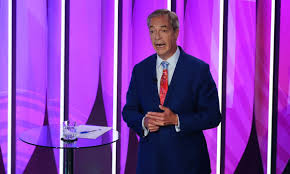Nigel Farage under fire: Former classmates accuse him of racist teenage behaviour — Starmer demands answers

Nigel Farage under fire: Former classmates accuse him of racist teenage behaviour — Starmer demands answers
A fresh political storm erupted in Westminster this week after Prime Minister Keir Starmer publicly pressed Reform UK leader Nigel Farage to address a wave of resurfaced allegations about racist behaviour during his teenage years. The controversy, triggered by detailed testimonies from former schoolmates, has intensified scrutiny of a politician who could potentially occupy No. 10 as his party continues to dominate opinion polls.
Starmer raised the issue during Prime Minister’s Questions in response to comments from Reform MP Lee Anderson. The prime minister referenced a lengthy investigation by The Guardian, which interviewed more than a dozen people who attended Dulwich College with Farage in the late 1970s and early ’80s. Many of them claimed Farage made aggressively racist comments as a schoolboy, including antisemitic slurs and chants.
“He didn’t have time to condemn the racist remarks of his own MP, and now he doesn’t have time to address what’s in today’s papers,” Starmer said, suggesting that Farage must directly confront the allegations rather than dismissing them.
The accusations range from verbal abuse toward minority-ethnic pupils to alleged chants invoking violence against Jewish, Black, and South Asian people. One of the most striking testimonies comes from now-celebrated filmmaker Peter Ettedgui, who says he endured repeated antisemitic taunts from Farage. He recalls Farage allegedly approaching him in class and whispering, “Hitler was right,” or mimicking the sound of gas chambers — remarks he described as humiliating and psychologically scarring.
Other former pupils recounted similar experiences. Some said Farage targeted younger students or confronted classmates from overseas backgrounds with phrases like “go home.” One former student said the encounters left a lasting sense of fear, particularly as Farage and other older boys would allegedly wait for visibly different students to arrive at school.
Not all contemporaries share these memories. A few describe Farage as loud, provocative, and attention-seeking, but claim they did not witness explicit racist behaviour. There is also no evidence linking him to far-right groups, nor proof that he holds such views today.
Still, several of those who came forward said they felt compelled to speak out after observing what they see as Farage’s refusal to show remorse. They argue that even if these remarks were made in youth, honesty and transparency are essential traits for someone vying to become prime minister.
Lord Walney, the government’s former adviser on political extremism, said the testimonies appear credible on their surface. What he found most troubling, he added, was Farage’s emphatic denial — which contradicts earlier statements where Farage admitted to saying “ridiculous things” as a teenager.
Political voices across the spectrum have reacted. Labour MPs warned that the allegations could alarm communities already facing rising racism and antisemitism. Liberal Democrats said many teenagers make offensive remarks, but suggested Farage “made a career out of it.” Advocacy groups such as Hope Not Hate argued that the claims align with Farage’s long history of inflammatory rhetoric.
Reform UK has condemned the publication as a politically timed smear campaign. A spokesperson insisted the allegations are “entirely without foundation,” noting the absence of written records from the period and accusing The Guardian of trying to undermine a party that has led “over 150 consecutive opinion polls.”
Despite the denials, the controversy is unlikely to fade soon. With Farage positioning himself as a contender for the highest office in the country, his past — and how he chooses to engage with it — has become a central point of debate in Britain’s evolving political landscape.
FAQ
1. What sparked the renewed controversy around Nigel Farage?
A series of testimonies from former classmates, published by The Guardian, alleged repeated racist and antisemitic behaviour by Farage during his school years.
2. How did Keir Starmer respond?
Starmer used PMQs to challenge Farage directly, urging him to address the allegations instead of dismissing them.
3. Has Farage admitted to the allegations?
No. Farage has issued blanket denials, calling the claims politically motivated and unfounded.
4. Is there evidence that Farage still holds such views?
There is no proof that he maintains any racist or antisemitic beliefs today, and some contemporaries insist he was merely provocative as a teenager.
5. Why is this issue important now?
With Reform UK leading polls and Farage positioning himself as a potential prime minister, his past behaviour and honesty about it have become part of national scrutiny.

